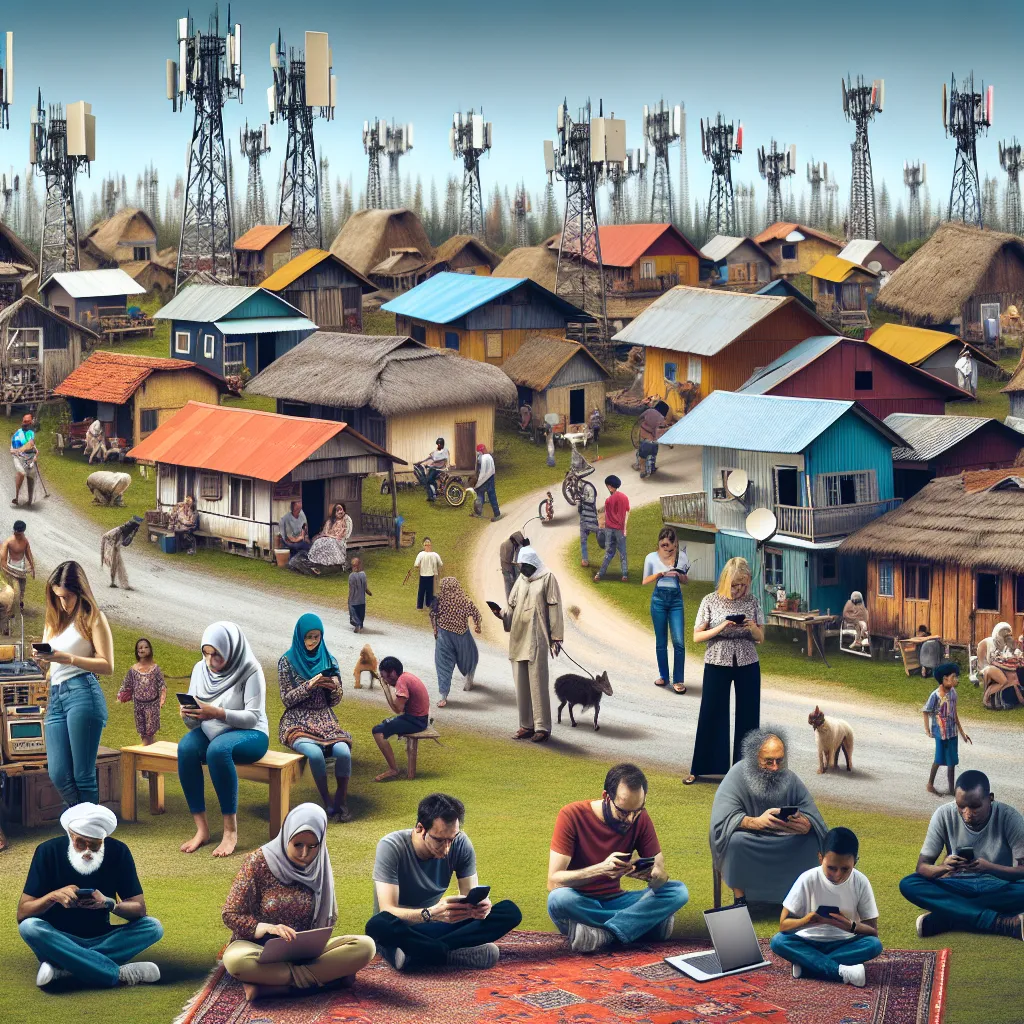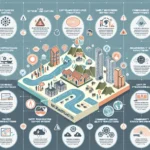Digital inclusion has become an increasingly important topic in recent years, particularly as technology continues to play a crucial role in our daily lives. As an IELTS Writing Task 2 expert, I’ve noticed a growing trend of questions related to this subject. Based on my analysis of past exams and current global issues, I predict that questions about promoting digital inclusion in underserved communities will likely appear more frequently in future IELTS tests.
Let’s examine a relevant IELTS Writing Task 2 question and explore how to craft a high-scoring response.
Some people believe that governments should focus on providing basic necessities like food and housing to underserved communities before investing in digital infrastructure. Others argue that digital access is equally important in today’s world. Discuss both views and give your own opinion.
Analyzing the Question
This question touches on the debate between prioritizing traditional basic needs and the emerging necessity of digital access. It requires you to:
- Discuss the view that governments should prioritize basic necessities.
- Explore the argument that digital access is equally important.
- Provide your own opinion on the matter.
Remember to address all parts of the question and support your arguments with relevant examples.
Sample Essay (Band 8-9)
In today’s rapidly evolving digital landscape, there is an ongoing debate about whether governments should prioritize providing basic necessities or invest in digital infrastructure for underserved communities. While both aspects are undeniably important, I believe that a balanced approach that addresses both traditional needs and digital inclusion is crucial for the overall development of these communities.
Those who advocate for prioritizing basic necessities argue that fundamental human needs such as food, shelter, and healthcare should take precedence over digital access. They contend that without these essentials, individuals cannot survive, let alone thrive in the digital world. For instance, in many developing countries, millions still lack access to clean water and adequate nutrition. Proponents of this view believe that allocating resources to digital infrastructure before addressing these critical issues would be misguided and potentially exacerbate existing inequalities.
On the other hand, supporters of digital inclusion argue that in the 21st century, access to technology and the internet has become a basic necessity in itself. They maintain that digital literacy and connectivity are essential for education, employment opportunities, and participation in the global economy. For example, during the COVID-19 pandemic, communities with better digital infrastructure were able to adapt more quickly to remote learning and work, highlighting the critical role of technology in modern society. Furthermore, digital tools can often enhance the delivery of basic services, such as telemedicine for healthcare and online platforms for food distribution.
In my opinion, while the provision of basic necessities should remain a top priority, governments should not view this as mutually exclusive with investment in digital infrastructure. A holistic approach that integrates both traditional and digital needs is likely to yield the most significant benefits for underserved communities. By simultaneously addressing basic requirements and promoting digital inclusion, governments can create a foundation for sustainable development and empower communities to overcome long-standing barriers to progress.
In conclusion, the debate between prioritizing basic necessities and digital infrastructure is complex, but not one that requires an either-or solution. A balanced strategy that recognizes the interconnectedness of traditional needs and digital access is essential for the comprehensive development of underserved communities in our increasingly digital world.
(Word count: 345)
 Digital inclusion in underserved communities
Digital inclusion in underserved communities
Sample Essay (Band 6-7)
In today’s world, there is a debate about what governments should focus on for underserved communities. Some people think basic needs like food and housing are most important, while others believe digital access is equally important. I will discuss both views and give my opinion.
Firstly, those who support focusing on basic necessities have a strong point. They argue that people need food, shelter, and healthcare to survive. Without these things, people cannot live well or participate in society. For example, in many poor areas, people don’t have enough to eat or clean water to drink. Supporters of this view think it’s more important to solve these problems before thinking about internet access.
On the other hand, those who believe in the importance of digital access also have good reasons. They say that in today’s world, the internet and technology are very important for education, finding jobs, and being part of the global community. During the COVID-19 pandemic, we saw how important digital access was for students to continue their education online. Also, many jobs now require computer skills, so without digital access, people might miss out on good opportunities.
In my opinion, both basic necessities and digital access are important, and governments should try to provide both. I think a balanced approach is best. While it’s crucial to make sure people have food and shelter, we shouldn’t ignore the benefits of digital inclusion. By providing both, governments can help underserved communities improve their lives in many ways.
To conclude, the debate between basic needs and digital access is not simple. However, I believe that governments should work on both aspects together to help underserved communities develop and have better opportunities in the modern world.
(Word count: 295)
Writing Tips
When addressing this topic, keep the following points in mind:
-
Structure: Ensure your essay has a clear introduction, body paragraphs discussing both viewpoints, and a conclusion with your opinion.
-
Vocabulary: Use a range of vocabulary related to technology and social development. For higher band scores, incorporate more sophisticated terms and phrases.
-
Grammar: Demonstrate your ability to use complex sentence structures and a variety of tenses. For Band 8-9, use more advanced grammatical constructions.
-
Cohesion and Coherence: Use linking words and phrases to connect ideas smoothly. Higher band essays should have more sophisticated transitions between paragraphs and ideas.
-
Examples: Provide relevant and specific examples to support your arguments. Band 8-9 essays typically include more nuanced and less obvious examples.
Key Vocabulary to Remember
-
Digital inclusion (noun) /ˈdɪdʒɪtl ɪnˈkluːʒn/: The practice of ensuring all individuals have access to digital technologies.
-
Underserved communities (noun phrase) /ʌndəˈsɜːvd kəˈmjuːnətiz/: Groups of people who have limited access to resources and services.
-
Infrastructure (noun) /ˈɪnfrəstrʌktʃə/: The basic physical and organizational structures needed for the operation of a society or enterprise.
-
Digital literacy (noun) /ˈdɪdʒɪtl ˈlɪtərəsi/: The ability to use information and communication technologies effectively.
-
Telemedicine (noun) /ˌtelɪˈmedɪsɪn/: The remote diagnosis and treatment of patients using telecommunications technology.
-
Holistic approach (noun phrase) /həʊˈlɪstɪk əˈprəʊtʃ/: A method of addressing a problem by considering all of its interconnected parts.
-
Digital divide (noun) /ˈdɪdʒɪtl dɪˈvaɪd/: The gap between those who have access to modern information technology and those who do not.
-
Empowerment (noun) /ɪmˈpaʊəmənt/: The process of becoming stronger and more confident, especially in controlling one’s life and claiming one’s rights.
In conclusion, the topic of promoting digital inclusion in underserved communities is likely to remain relevant in future IELTS Writing Task 2 questions. By understanding the key issues and practicing with sample essays like those provided, you can improve your ability to address this topic effectively. Remember to consider both the importance of basic necessities and the growing significance of digital access in today’s world.
To further enhance your skills, try writing your own essay on this topic or related ones, such as:
- The role of private companies in promoting digital literacy in rural areas
- The impact of mobile technology on financial inclusion in developing countries
- Balancing traditional education with digital skills training in school curricula
Feel free to share your practice essays in the comments section for feedback and discussion. This active engagement will help you refine your writing skills and prepare more effectively for your IELTS exam.


